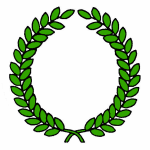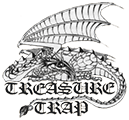Olympia
Olympia

| Other names | Pyrolatrius, the Ember, the Hero |
| Alignment | Head of the Bone Pantheon |
| Opposite (Seal) | Astalon |
| Opposite (Sword) | Vivamort |
| Holy symbol | Laurel wreath |
…on the day the gate was smashed, Andronikos raised his shield and faced certain death to save the people of Thessalon from the Perelastran Horde. The Immortals laughed – how could one man possibly hold the gate alone? But Andronikos was not afraid – he drew his sword and prepared to meet his god. Immortal after Immortal fell to his sword as they charged – but try as they might, they could not slay the one hoplite who stood against them. Night fell, and still he fought on. Dawn rose, and the Perelastrans saw to their dismay that Andonikos stood alone atop a mound of dead men. Four days later, a Palladian phalanx arrived to break the siege. When they did, they found a new man to join the brotherhood of heroes – and when he walked from the gateway battered, bloodied and bruised, they raised him high upon their shields and named him that he might live forever as Andronikos, the Defender.
The Defence of Thessalon, as told to Eudokia the Scribe
History
Olympia was the god of heroism. One of the founders of Haladria, it was she who set out the code of heroism and suggested the Olympics as a way of resolving differences between the members of the Haladric League.
The church of Olympia was based on Mount Olympus, and it was here that the Avatar of Olympia was to be found tending the ever burning flame. Smaller temples to Olympia are common in Haladria. These smaller temples also acted as places that were the common people could place wagers on the outcome of the games.
While almost unknown outside of Haladria, within the League Olympia was second only to Morpheus and Ishmund in importance. Though most people only prayed to Olympia directly during the time of the games themselves, she did have a small and dedicated priesthood who not only oversaw the Olympics themselves but also all other heroic challenges and maintained the Book of Ages- a history of all heroes past and present.
To Haladric people the Sundering of Heaven is synonymous with the disaster at the Olympics and Olympia is widely believed to have been the first god to die.
The current Olympia is in fact a Paladin of Olympia, Pyrolatrius the Ember. At the last Olympics he and the other members of the Torch pantheon ascended to godhood and he took on her mantle, and grants spirits to her priests. So far no doctrinal difference has been noted.
Philosophy
Olympia is the goddess of Haladric heroism. The Heroic Code of Haladria states that heroes should achieve great deeds so that their names become known to all. These deeds need not be morally good, rather epic in scale and universally renowned. When enough people know your name, your memory will live forever, granting a form of immortality. Some of the greatest heroes became so well known that they actually ascended to Godhood upon their deaths.
Heroes settle their differences through challenges, be these of wit, skill or combat. Once a matter has been settled by a challenge, both parties must abide by the outcome.
(A complete copy of the Heroic Code can be found here)
Followers of Olympia strive to follow the Heroic Code in the hopes of achieving immortality or possibly even godhood. Even those who are not heroes can strive personal greatness, the potential for heroism exists in everyone.
The Olympic games are held every four years atop Mount Olympus in Haladria. Here the great heroes of the Haladric states gather to settle their differences in a series of challenges and games. The Olympics were instigated by the original Olympia when she was mortal as a way for the states to settle their differences without resorting to warfare or diplomatic bickering that would tear the League apart. It is thus the holy duty of all her followers to see that the Olympics run smoothly and that their outcome is widely known.
The Undying Flame of Olympia burns atop Mount Olympus, representing the continuity of the Olympics and thus Haladria. While it was extinguished during the Sundering it now burns again. The Flame is symbolic of the fire that burns in the breast of a true hero and the priesthood consider it their duty to protect not only the physical flame but to act as the guardians of the heroic way of life. This often puts them in conflict with more progressive parts of Haladric culture.
The holy symbol of Olympia was a laurel wreath. She is usually depicted as a young Haladric woman with a laurel wreath upon her brow. She is always depicted in the midst of some kind of heroic deed. Some recent depictions instead show Pyrolatrius’ male form instead, it is not clear if this practice will become common.
Strands
Unlike the other gods of the Torch pantheon, the worship of Olympia has never spread outside of Haladria and until very recently was never big enough to have distinct strands, with all its effort to running the Olympic games that are so central to Haladric culture. If foreign heroes start to convert to her worship this will no doubt change. However, we could theorise on the existence of Aspirants, who seek to emulate heroic deeds in Olympia’s name; Watchers of the Flame, who run the games and ensure that all abide by the outcome; and Chroniclers, those who remember the names and deeds of past heroes.
Strictures
Heroes are made by their known deeds; ensure their names shall live forever.
Through your acts, create heroes.
Elementals and Demons corrupt the world; seek to limit their influence.
Domains
Primary domain: Healing
Secondary domains: Debilitation, Dismissal, Harming, Necromancy, Restoration
